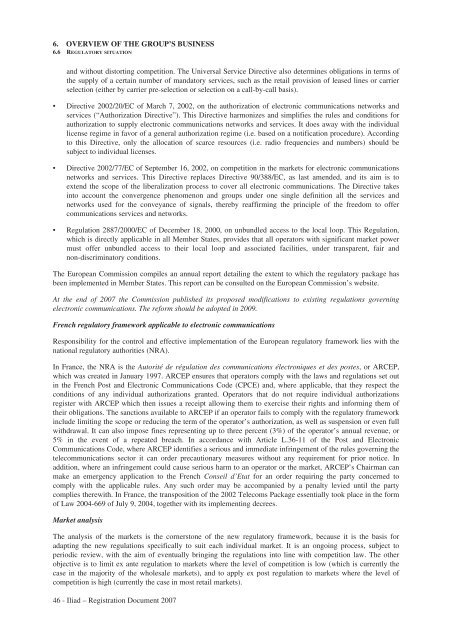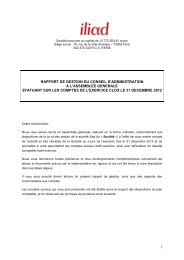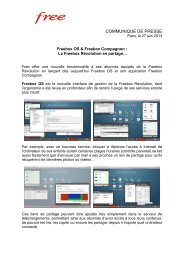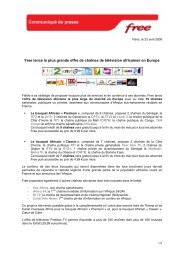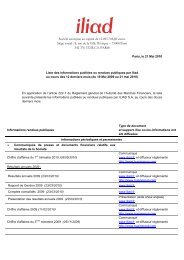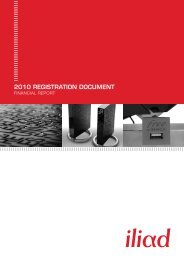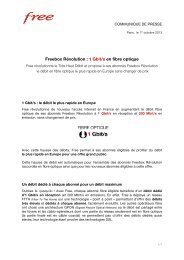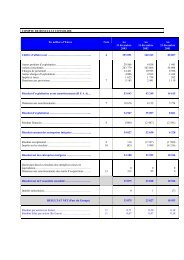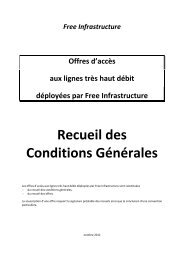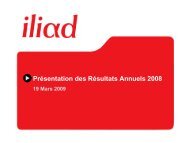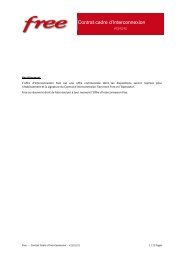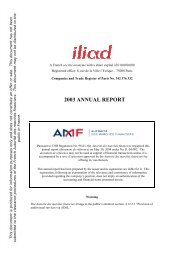REGISTRATION DOCUMENT AND FINANCIAL REPORT - Iliad
REGISTRATION DOCUMENT AND FINANCIAL REPORT - Iliad
REGISTRATION DOCUMENT AND FINANCIAL REPORT - Iliad
- TAGS
- registration
- iliad
- iliad.fr
You also want an ePaper? Increase the reach of your titles
YUMPU automatically turns print PDFs into web optimized ePapers that Google loves.
6. OVERVIEW OF THE GROUP’S BUSINESS<br />
6.6 REGULATORY SITUATION<br />
and without distorting competition. The Universal Service Directive also determines obligations in terms of<br />
the supply of a certain number of mandatory services, such as the retail provision of leased lines or carrier<br />
selection (either by carrier pre-selection or selection on a call-by-call basis).<br />
• Directive 2002/20/EC of March 7, 2002, on the authorization of electronic communications networks and<br />
services (“Authorization Directive”). This Directive harmonizes and simplifies the rules and conditions for<br />
authorization to supply electronic communications networks and services. It does away with the individual<br />
license regime in favor of a general authorization regime (i.e. based on a notification procedure). According<br />
to this Directive, only the allocation of scarce resources (i.e. radio frequencies and numbers) should be<br />
subject to individual licenses.<br />
• Directive 2002/77/EC of September 16, 2002, on competition in the markets for electronic communications<br />
networks and services. This Directive replaces Directive 90/388/EC, as last amended, and its aim is to<br />
extend the scope of the liberalization process to cover all electronic communications. The Directive takes<br />
into account the convergence phenomenon and groups under one single definition all the services and<br />
networks used for the conveyance of signals, thereby reaffirming the principle of the freedom to offer<br />
communications services and networks.<br />
• Regulation 2887/2000/EC of December 18, 2000, on unbundled access to the local loop. This Regulation,<br />
which is directly applicable in all Member States, provides that all operators with significant market power<br />
must offer unbundled access to their local loop and associated facilities, under transparent, fair and<br />
non-discriminatory conditions.<br />
The European Commission compiles an annual report detailing the extent to which the regulatory package has<br />
been implemented in Member States. This report can be consulted on the European Commission’s website.<br />
At the end of 2007 the Commission published its proposed modifications to existing regulations governing<br />
electronic communications. The reform should be adopted in 2009.<br />
French regulatory framework applicable to electronic communications<br />
Responsibility for the control and effective implementation of the European regulatory framework lies with the<br />
national regulatory authorities (NRA).<br />
In France, the NRA is the Autorité de régulation des communications électroniques et des postes, or ARCEP,<br />
which was created in January 1997. ARCEP ensures that operators comply with the laws and regulations set out<br />
in the French Post and Electronic Communications Code (CPCE) and, where applicable, that they respect the<br />
conditions of any individual authorizations granted. Operators that do not require individual authorizations<br />
register with ARCEP which then issues a receipt allowing them to exercise their rights and informing them of<br />
their obligations. The sanctions available to ARCEP if an operator fails to comply with the regulatory framework<br />
include limiting the scope or reducing the term of the operator’s authorization, as well as suspension or even full<br />
withdrawal. It can also impose fines representing up to three percent (3%) of the operator’s annual revenue, or<br />
5% in the event of a repeated breach. In accordance with Article L.36-11 of the Post and Electronic<br />
Communications Code, where ARCEP identifies a serious and immediate infringement of the rules governing the<br />
telecommunications sector it can order precautionary measures without any requirement for prior notice. In<br />
addition, where an infringement could cause serious harm to an operator or the market, ARCEP’s Chairman can<br />
make an emergency application to the French Conseil d’Etat for an order requiring the party concerned to<br />
comply with the applicable rules. Any such order may be accompanied by a penalty levied until the party<br />
complies therewith. In France, the transposition of the 2002 Telecoms Package essentially took place in the form<br />
of Law 2004-669 of July 9, 2004, together with its implementing decrees.<br />
Market analysis<br />
The analysis of the markets is the cornerstone of the new regulatory framework, because it is the basis for<br />
adapting the new regulations specifically to suit each individual market. It is an ongoing process, subject to<br />
periodic review, with the aim of eventually bringing the regulations into line with competition law. The other<br />
objective is to limit ex ante regulation to markets where the level of competition is low (which is currently the<br />
case in the majority of the wholesale markets), and to apply ex post regulation to markets where the level of<br />
competition is high (currently the case in most retail markets).<br />
46 - <strong>Iliad</strong> – Registration Document 2007


